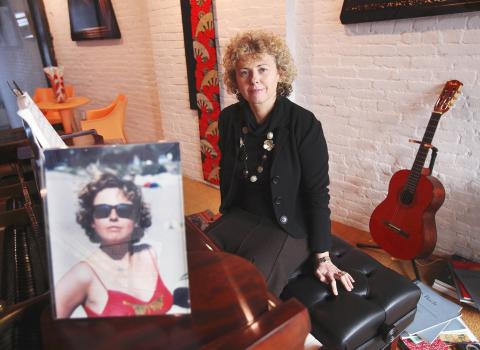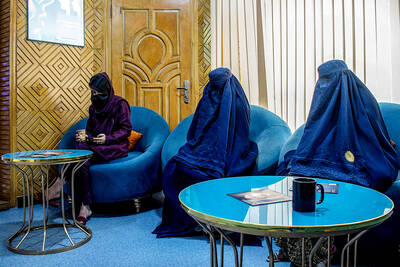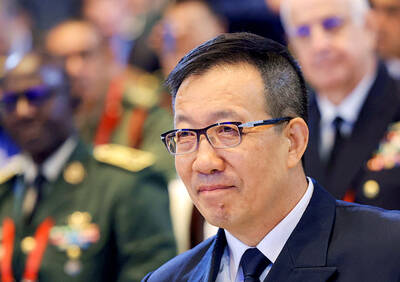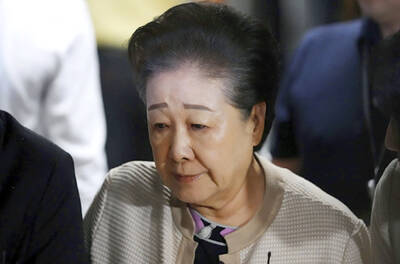Susanna Mancini cherishes a photo of herself at 27 — a smiling face behind a pair of dark sunglasses. On it, she scrawled to her future husband: “Too bad you can’t see my eyes. I am so proud of my tough yuppie stare.”
Her professional pride propelled her early career as a lawyer.
She was successful and well paid for it. She kept working when her first child was born and was promoted to a more senior position in Citibank after her second child arrived.

Photo: Reuters
However, her career eventually succumbed to something Mancini never expected would end her rise at the bank — her husband’s even bigger success.
She quit in 2005 when her six-digit income was overtaken by his seven-digit one.
“At that point, it was clear that my wage had become family pocket money. There was a real opportunity to do other things that did not require being chained to a desk,” said Mancini, now 50.
She is far from alone, according to a new study by the US Federal Reserve, due to be published shortly.
It shows that between 1993 and 2006, there was a decline in the workforce of 0.1 percent a year on average in the number of college-educated women with similarly educated spouses. That contrasts with growth of 2.4 percent a year between 1976 and 1992.
The result: The US labor force in 2008 had 1.64 million fewer such women than if the growth rate had kept up its earlier trend, slightly more than 1 percent of the total US workforce in that year.
Stefania Albanesi, a senior economist at the Federal Reserve Bank of New York and one of the study’s authors, said the loss may hurt US economic growth at a time when the nation can ill afford to have highly skilled workers on the sidelines.
While the overall jobless rate remains high, the US faces skill shortages in some areas and the unemployment rate for college graduates is just above 4 percent.
Albanesi links the decline in the number of well-educated, married women entering the labor force to a sharp rise in salaries for top earners in the US, and in particular for men.
In 1975, college graduates of both sexes were making 43 percent more than non-college graduates. By 2008, the figure had risen to 92 percent for men and to 70 percent for women.
“In the last 20 years, wages for highly educated males increased so much that they dwarfed the family’s second income, usually the one of their wives,” said Albanesi, who co-authored the study with Columbia University graduate student Maria Prados. “The result was that sometimes married women exited the labor force mid-career, exactly around the time their husbands are promoted to more senior roles. They stopped getting income they didn’t need and so they left the labor force forever.”
In a previous study, Albanesi estimated that the rise of all women participating in the labor market boosted US GDP by 42 percent between 1920 and 1990.
Once the 2007-2009 recession hit, the female retreat from the workforce halted for a couple of years — women and men alike returned to the workforce when their spouses lost jobs or when their incomes fell, and also to make up for a loss in the value of housing and stocks.
However, as the US economy has stabilized in the past two years, there have been signs that the retreat has resumed, Albanesi said.
Of all working-age women, 58.6 percent were either working or looking for a job in 2010, down from 59.2 percent in 2009.
The Bureau of Labor Statistics expected the rate to fall further by 2020.
Albanesi said it was not the tug of looking after young children that made most educated women give up their career.
“These women usually give up their jobs when their children are school-age and not babies any more,” Albanesi said.

Decked out with fake crystal chandeliers and velvet sofas, cosmetic surgery clinics in Afghanistan’s capital are a world away from the austerity of Taliban rule, where Botox, lip filler and hair transplants reign. Despite the Taliban authorities’ strict theocratic rule, and prevailing conservatism and poverty in Afghanistan, the 20 or so clinics in Kabul have flourished since the end of decades of war in the country. Foreign doctors, especially from Turkey, travel to Kabul to train Afghans, who equally undertake internships in Istanbul, while equipment is imported from Asia or Europe. In the waiting rooms, the clientele is often well-off and includes men

BEIJING FORUM: ‘So-called freedom of navigation advocated by certain countries outside the region challenges the norms of international relations,’ the minister said Chinese Minister of National Defense Dong Jun (董軍) yesterday denounced “hegemonic logic and acts of bullying” during remarks at a Beijing forum that were full of thinly veiled references to the US. Organizers said that about 1,800 representatives from 100 countries, including political, military and academic leaders, were in Beijing for the Xiangshan Forum. The three-day event comes as China presents itself as a mediator of fraught global issues including the wars in Ukraine and Gaza. Addressing attendees at the opening ceremony, Dong warned of “new threats and challenges” now facing world peace. “While the themes of the times — peace and development —

COMFORT WOMEN CLASH: Japan has strongly rejected South Korean court rulings ordering the government to provide reparations to Korean victims of sexual slavery The Japanese government yesterday defended its stance on wartime sexual slavery and described South Korean court rulings ordering Japanese compensation as violations of international law, after UN investigators criticized Tokyo for failing to ensure truth-finding and reparations for the victims. In its own response to UN human rights rapporteurs, South Korea called on Japan to “squarely face up to our painful history” and cited how Tokyo’s refusal to comply with court orders have denied the victims payment. The statements underscored how the two Asian US allies still hold key differences on the issue, even as they pause their on-and-off disputes over historical

BRIBERY ALLEGATIONS: A prosecutor said they considered the risk of Hak-ja Han tampering with evidence to be very high, which led them to seek the warrant South Korean prosecutors yesterday requested an arrest warrant for the leader of the Unification Church, Hak-ja Han, on allegations of bribery linked to the country’s former first lady and incitement to destroy evidence. The move came a day after the 82-year-old was questioned over her alleged role in bribing former first lady Kim Keon-hee and a lawmaker. Founded in 1954 by her late husband, Sun Myung Moon, the Unification Church has long been the subject of controversy and criticism, with its teachings centered on Moon’s role as the “second coming” and its mass weddings. Followers are derisively referred to as “Moonies.” However, the church’s